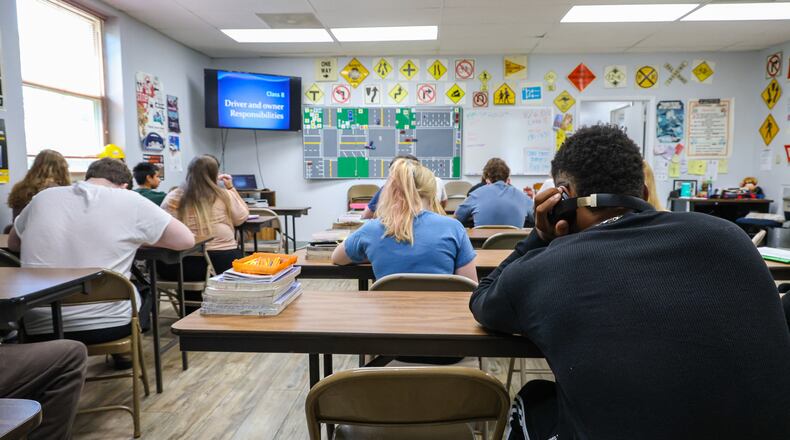Current law requires all new drivers under 18 years old to get a formal driver’s education.
“We’ll be busier,” said Sharon Fife, president of Kettering’s D&D Driving School, in an interview with this news outlet. She estimated that the change could increase demand for driver’s education courses by 25%.
The law change was included in the state’s newly passed two-year operating budget. It has long been a priority for Ohio Gov. Mike DeWine, a Republican whose two terms leading the state have been marked by road safety initiatives, including a ban on texting while driving and a so-far-unheeded call to make not wearing a seatbelt a primary offense.
In Springfield in September 2024, while addressing the hurdles of educating the city’s Haitian population on how to safely navigate Ohio’s roads, DeWine noted that a lack of driver’s education wasn’t confined just to Haitian immigrants.
“We’re seeing 18-year-olds who have lived their entire life in the United States who walk in and manage to pass a test, but never had any experience driving before, no time behind the wheel, nor have they had any driver’s education. That’s a problem, and we have to change this,” DeWine said.
Fife said a significant portion of her students — something like one in every five — are wannabe drivers who are not legally required to get a formal driver’s education. And, while Fife said she hoped the state would eventually move to make driver’s education compulsory for all new drivers, she said this change was a step in the right direction.
Credit: Bryant Billing
Credit: Bryant Billing
“Honestly, in my opinion, it should be any first-time driver. I mean, it really should be, because what makes you smarter at 22, or 21, or 25? You’re older, but it’s still a new thing, and you would hope that someone would get an education,” Fife said.
Dan Tierney, a spokesperson for the governor, told this outlet in an interview that the change is focused on a specific data point: More 18- and 19-year-olds are getting into injury accidents than 16- and 17-year-olds.
Tierney called this a “counterintuitive fact” that goes against the popular belief that the younger the driver, the more likely they are to get in an accident, and correlated the data with Ohio’s law allowing Ohioans 18 and older to get a license without a formal driver’s education.
DeWine’s other priority, to create a grant program to allow schools to create or outsource driver’s education courses, was nixed from the budget. Tierney told this outlet that lawmakers took issue with how DeWine drew up the proposed program’s funding, which would have come out of recreational marijuana revenues.
“We will continue to talk about that one,” Tierney said. “The legislature took out all the marijuana finance-related provisions and said that they would be discussing the issue more in the fall, so we look forward to continuing the discussion.”
The budget did put in a requirement for public schools to excuse students from non-core curriculum for the purposes of attending private driver’s education courses.
The driver’s education landscape has changed significantly in recent years, Fife said. She saw several competitors close their doors due to the pandemic. Live Zoom classes, spurred by COVID-19, are now a mainstay for D&D (Fife said most of her students opt for virtual classes) and many other instruction sites, which helps accommodate the plethora of drivers across Ohio that lack a nearby driver’s education course.
“Many schools in this area — south Dayton — closed. So we’ve been busy anyway since COVID,“ Fife said. ”So, I mean, we’re doing our best. We’re hiring and training, training, training. We’ll do the best we can to keep up and try to service the area."
Credit: Bryant Billing
Credit: Bryant Billing
For more stories like this, sign up for our Ohio Politics newsletter. It’s free, curated, and delivered straight to your inbox every Thursday evening.
Avery Kreemer can be reached at 614-981-1422, on X, via email, or you can drop him a comment/tip with the survey below.
About the Author



